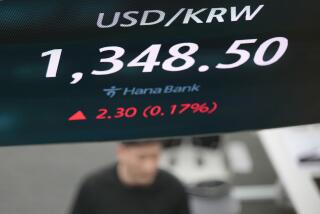Tokyo Stock Exchange’s Key Index at Record High as ’88 Trading Ends
- Share via
TOKYO — The world’s richest stock market, outracing other major exchanges in recovering from the 1987 crash, ended 1988 trading Wednesday with its major index at a record high, up 42% for the year.
Analysts looked for gains to continue into next year on the Tokyo Stock Exchange, where the start of the six-day New Year holidays began with a ritual hand-clapping by 2,000 traders.
In what one dealer described as a “festival market” Wednesday, the 225-share Nikkei index climbed 108.07 points, or 0.36%, and ended the year at a record 30,159.00.
The Nikkei had opened 1988 at 21,217.04. By April, it was at the 27,000-point level, above its highs before the October, 1987, crash. The foundering New York and London markets have yet to regain pre-crash levels.
Analysts said the market climbed despite a number of obstacles, including a massive stock-profiteering scandal, Emperor Hirohito’s illness, currency fluctuations and unstable oil prices.
“There were some negative factors from time to time, but the overall market situation was healthy and bullish throughout the year,” said Mike Morizumi at Merrill Lynch & Co.’s Tokyo office.
“All bad news has been discounted already and the market is as strong as it looks,” he said. “It turned out to be much better than most of us expected at the beginning of the year.”
Josen Takahashi, an economist at Mitsubishi Research Institute, a major think tank, said Tokyo was able to recover faster than other markets from the 1987 crash because of Japan’s brisk economic growth and a calm business environment.
Ethics Challenged
“Japan was in the middle of a historical domestic demand expansion in the fourth quarter of 1987 and the first quarter of 1988,” Takahashi said. “The market crash luckily coincided with that period.”
Analysts said, however, that the rise of Tokyo stock prices was hindered by a major scandal in which dozens of prominent politicians and business leaders were offered unlisted shares in Recruit-Cosmos, a real estate company, at bargain rates. They profited after the stock was publicly offered and rose in price.
The transactions were legal, but opposition parties and the general public questioned the ethics of influential figures taking advantage of privileged access to unlisted shares.
“The scandal knocked a lot of confidence from the market and it prevented the Nikkei from moving high,” said Morizumi. “And there are still some aftereffects.”
Starting in April, investors’ gains from stock transactions won’t be as big. A tax reform package enacted this week imposes a 20% capital gains tax. But the tax is not expected to adversely affect the market.
The illness of the 87-year-old emperor has been seen as a damper on active investing. Hirohito fell seriously ill on Sept. 19 and has been bedridden.
Many investors do not want to be sitting with large stock holdings when the emperor dies, analysts said.
“The market will go down a little bit when he does die,” said Morizumi. “But that’s just a sympathetic gesture and it will recover thereafter.”
Thomas Zengage of International Business Information, a consulting firm based in Tokyo, said most major problems in the market already have been reflected in current share prices and bullishness likely will carry into the first half of 1989.
“Unless there is a dramatic change in the market environment such as the sudden crash of land prices or a drastic fluctuation of exchange rates, the Tokyo stock market will continue to be strong for a while,” he said.
With total value of shares exceeding 400 trillion yen, or about $3.23 trillion, the Tokyo Stock Exchange is the world’s richest. The Japanese market accounts for about 45% of the total value of the world’s stock markets, compared to about 30% for the United States.
More to Read
Sign up for Essential California
The most important California stories and recommendations in your inbox every morning.
You may occasionally receive promotional content from the Los Angeles Times.













